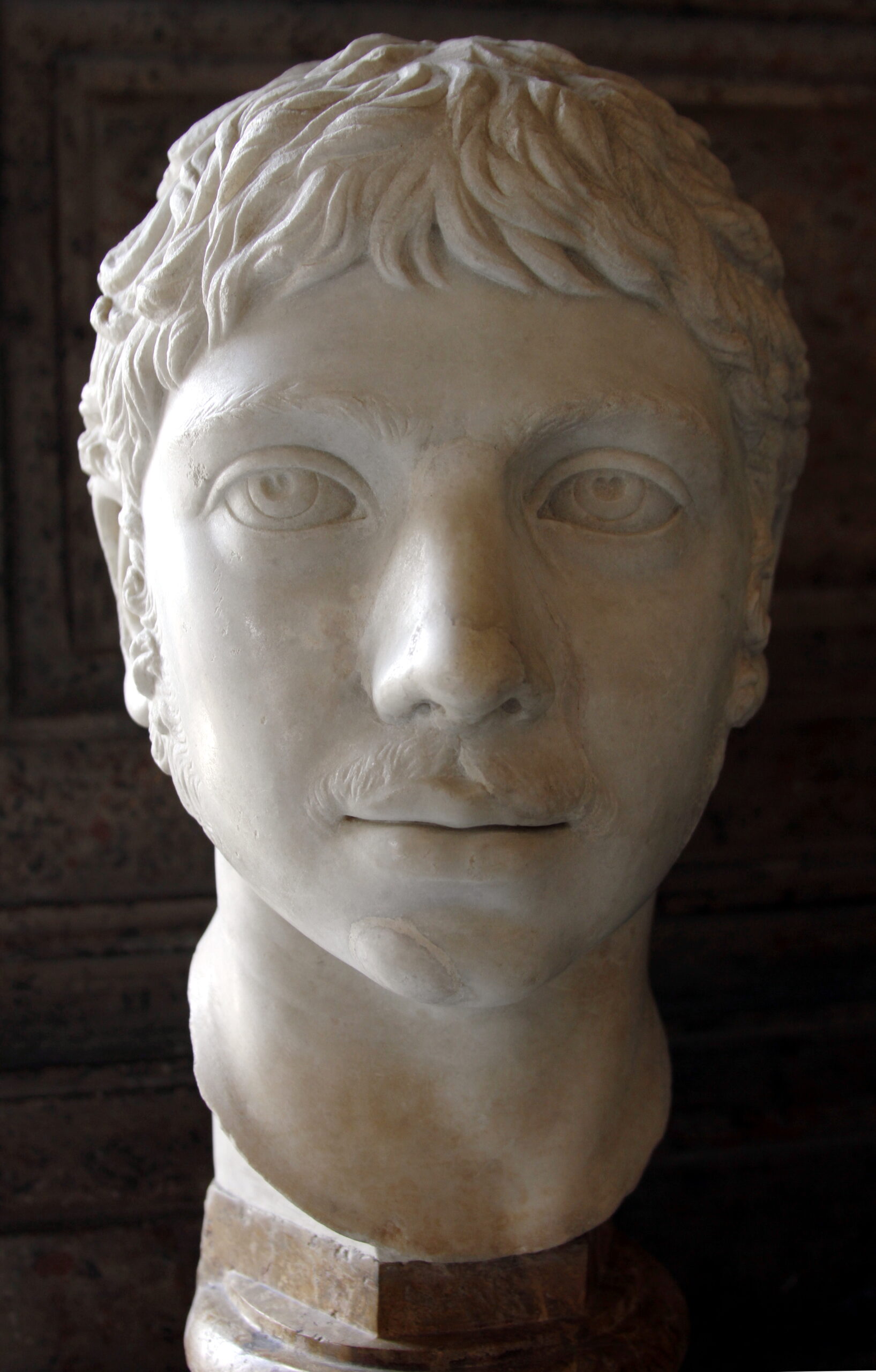**The Burning of the Library of Alexandria in 48 BC: Julius Caesar, Military Tactics, and the Loss of Antiquity’s Greatest Treasure**
The destruction of the Library of Alexandria stands as a pivotal tragedy in the annals of intellectual history, symbolizing the vulnerability of human knowledge to the ravages of war and political intrigue. The event most often connected to the library’s demise is the fire of 48 BC, which occurred during Julius Caesar’s involvement in the Alexandrian Civil War. While Caesar did not purposefully target the library, the consequences of his military actions led to an incalculable loss of wisdom and cultural heritage. This essay will examine the circumstances that led to the burning of the library, the motivations and actions of Julius Caesar, the nature and extent of the destruction, and the broader implications for the preservation and loss of knowledge in the ancient world.
**I. The Political and Military Context: Caesar in Alexandria**
In the autumn of 48 BC, Julius Caesar arrived in Egypt after his decisive victory over Pompey the Great at Pharsalus. Egypt, though officially an ally of Rome and ruled by the Ptolemaic dynasty, was embroiled in a bitter dynastic conflict between the young Ptolemy XIII and his sister Cleopatra VII. Caesar, ever the political strategist, became enmeshed in this civil war, aligning himself with Cleopatra in her bid for the throne.
The situation rapidly escalated. Caesar’s forces, numbering only a few thousand, found themselves isolated in Alexandria, surrounded by the much larger armies loyal to Ptolemy XIII. The Roman general was not only outnumbered but also cut off from reinforcements and supplies. As the fighting intensified, both sides vied for control of the city’s strategic assets, chief among them the harbor and its fleet.
**II. The Decision to Burn the Egyptian Fleet**
Recognizing the tactical importance of the harbor, Caesar resolved that the Egyptian fleet, if left intact, could be used by Ptolemy’s forces to blockade the Romans or to launch attacks on their positions. In a calculated move, Caesar ordered the burning of the Egyptian warships docked in Alexandria’s harbor. The intention was to deny the enemy a valuable resource and to secure Roman control over the waterfront.
Ancient historians such as Plutarch and Cassius Dio recount that the fire spread rapidly from the ships to the adjacent docks and, tragically, to parts of the city itself. Alexandria, with its dense urban fabric and many wooden structures, was particularly vulnerable to conflagrations. The flames leapt from the harbor into the neighboring districts, including the storied area of the Mouseion, where the Library of Alexandria was housed.
**III. The Library of Alexandria: An Intellectual Beacon**
The Library of Alexandria, founded in the early third century BC under the patronage of the Ptolemaic kings, was far more than a collection of scrolls. It was the preeminent center of learning in the ancient world, drawing scholars, poets, philosophers, and scientists from across the Mediterranean. The library’s holdings were immense, reportedly numbering hundreds of thousands of papyrus scrolls encompassing literature, philosophy, science, mathematics, and historical works.
The library was not a static archive but a vibrant institution, with a staff of resident and visiting scholars who engaged in research, debate, and the production of new knowledge. Its destruction thus represented not only the loss of texts but also the silencing of an active intellectual community.
**IV. The Fire and Its Consequences**
While Caesar did not explicitly intend to destroy the Library of Alexandria, the fire he set as a tactical measure against the Egyptian fleet proved uncontrollable. Ancient sources offer varying accounts of the extent of the damage. Plutarch, in his *Life of Caesar*, notes that the fire spread to the great library and caused its destruction. Cassius Dio similarly records that “much of the library was destroyed.” Strabo, a geographer who visited Alexandria some decades later, suggests that the Mouseion and its associated library survived, implying that only the “warehouse” or external storage depots of scrolls near the docks were consumed by the flames.
Modern historians debate these accounts, but there is consensus that a significant portion of the library’s holdings—whether the main collection or associated storage facilities—was lost in the fire of 48 BC. The destruction was not total, as the library seems to have persisted in some form for centuries afterward, but the loss was nonetheless devastating. Ancient estimates claim that up to 40,000 scrolls perished in this incident, though the true number is impossible to determine.
**V. Julius Caesar’s Responsibility: Intent and Consequence**
It is critical to distinguish between intent and consequence in evaluating Caesar’s role in the burning of the library. Caesar’s primary objective was military survival; he sought to neutralize the Egyptian fleet, not to erase the intellectual heritage of the ancient world. The fire’s spread to the library was an unintended byproduct of the chaos of urban warfare. That said, the episode serves as a stark reminder of the collateral damage that warfare inflicts upon culture and civilization.
Caesar’s actions reflected a broader truth: the priorities of power and survival often overshadow considerations of cultural preservation. In the heat of battle, the fate of books and knowledge was subordinated to immediate tactical concerns. The loss of the library was not premeditated, but it was not wholly unpredictable in the context of large-scale urban conflict.
**VI. The Legacy of the Library’s Destruction**
The burning of the Library of Alexandria in 48 BC had repercussions far beyond the immediate context of Caesar’s campaign. The library’s destruction became a symbol of the fragility of human achievement and the perpetual tension between war and wisdom. The loss of so many works—many of them unique and irreplaceable—created a cultural wound that would never fully heal.
The precise contents of the destroyed scrolls remain shrouded in mystery. Among the works lost may have been treatises on philosophy, history, science, and literature from across the ancient world, including texts by figures whose names are now only echoes. The absence of these works hampered the transmission of knowledge to subsequent generations, creating gaps that have challenged scholars for centuries.
Subsequent incidents of destruction, whether during the later Roman, Christian, or Islamic periods, further compounded the loss. Yet the fire of 48 BC stands out as the first and perhaps most significant blow, highlighting the vulnerability of even the greatest repositories of human thought.
**VII. Historiographical Debates and Myths**
Over time, the story of the burning of the Library of Alexandria has acquired an almost mythic status. Ancient and modern authors alike have used it as a cautionary tale about the perils of ignorance, intolerance, and violence. The details have often been embellished or conflated with other episodes of destruction. Later fires under Emperor Aurelian, the decree of Theophilus in the late fourth century AD, and the Arab conquest in the seventh century have all been cited as contributing to the library’s final demise.
Nevertheless, the fire of 48 BC is unique in that it resulted directly from a military action by one of history’s most prominent figures. The episode thus serves as a focal point for discussions about the responsibility of leaders to protect—not just conquer—the cultural inheritance of humanity.
**VIII. The Broader Implications: War, Knowledge, and Memory**
The loss of the Library of Alexandria forces a reckoning with the relationship between power and knowledge. The library was a project of statecraft as well as scholarship, a manifestation of the Ptolemaic dynasty’s ambition to make Alexandria the intellectual capital of the world. Its destruction, even if unintended, was a byproduct of the contest for political supremacy.
The fire illustrates the precariousness of cultural achievements in the face of military and political upheaval. While states and armies may rise and fall, the loss of accumulated knowledge represents a more profound and enduring setback. The burning of the library reminds us that the transmission of wisdom across generations depends not only on the creation of knowledge but also on its protection and stewardship.
**Conclusion**
The burning of the Library of Alexandria in 48 BC during Julius Caesar’s military campaign was an unintended but catastrophic consequence of tactical warfare. Caesar’s decision to set fire to the Egyptian fleet, motivated by immediate military necessity, unleashed a conflagration that consumed a significant portion of the world’s greatest repository of ancient knowledge. The episode stands as a testament to the destructive power of war and the vulnerability of even the most treasured cultural institutions. While Caesar did not deliberately target the library, the outcome of his actions underscores the broader costs of conflict and the fragile nature of civilization’s intellectual legacy. The silence that now inhabits the halls where the library once stood is a potent reminder of what can be lost when the imperatives of power eclipse the commitment to preserve humanity’s shared heritage. The tragedy of Alexandria endures as both a warning and an inspiration: a warning of the ease with which knowledge can be lost, and an inspiration to safeguard and cherish the wisdom that survives.


